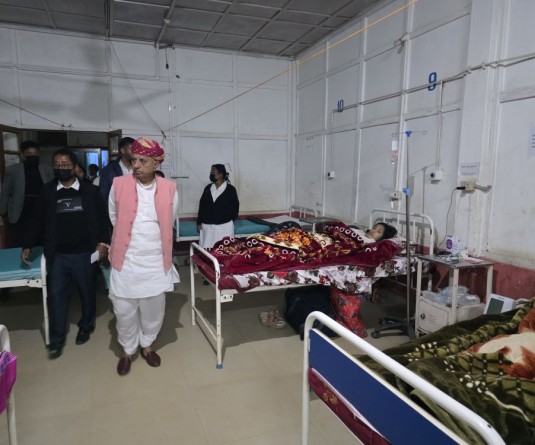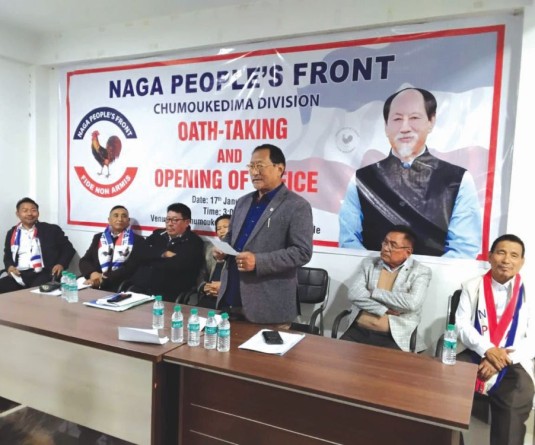.jpg)
Chümoukedima, September 14 (MExN): The Department of History, Patkai Christian College (autonomous) on September 12 organized an interactive dialogue on “Understanding the Process of Repatriating Naga Ancestral Remains.” The session sought to explore and understand the ongoing process of repatriating Naga ancestral human remains from the Pitt Rivers Museum (PRM), University of Oxford, and featured members of the Forum for Naga Reconciliation (FNR) and the Recover Restore and Decolonise (RRaD) team.
The FNR-RRaD team comprised Rev. Dr Ellen Konyak Jamir, Coordinator, RRaD, Nepuni Piku, Dr Aküm Longchari and Sopie Joel Rungsung. The session was chaired by Dr Thejalhoukho Casavi, a faculty member in the History Department.
Rev. Dr Ellen Konyak Jamir presented three key points on the repatriation process. She stressed that “repatriation has to be pursued as an initiative of the Nagas as a whole, and not by an individual or an institution,” framing the process as a collective responsibility. She said repatriation was “far more than the physical return of bones” and had prompted Nagas to “reexamine their history and identity through the lens of dignity.” She added that the journey had “spurred the Nagas to act as a people, rising above divisions in order to reclaim what rightfully belongs to them.” She also underscored repatriation as “a process towards healing and reconciliation” and, while stressing the importance of addressing intergenerational trauma, urged the need to understand “the ways in which contemporary challenges may mirror long histories of unresolved or unaddressed pain and suffering.”
Speaking on “Nagas yesterday, today and tomorrow,” Nepuni Piku outlined the historical trajectory of the Nagas from the pre-colonial to the post-colonial period. He called for deeper engagement with the concepts of human dignity, self-determination and indigenous peoples, contrasting these with the “contemporary incorporated subaltern status viz: as Scheduled Tribe(s) imposed on Nagas post independent India.” He observed that non-state nations and peoples like the Nagas were excluded from rights-forming processes such as exercising self-determination during decolonization, “at a time when there was no concrete established International Instrument recognizing their legal personality under International law apart from the modern (Westphalian) state members who constituted the newly emerging majority members of the international order coming together under multilateral institutions like the United Nations.”
Piku noted that the post-decolonization period saw incremental recognition “in the form of International Convention ILO 107 (1957), ILO 169 (1989) and UNDRIP 2007 due to the continuing vulnerability of the indigenous peoples across the globe.” He highlighted how the denial of recognition of the Naga nation state resulted in “the misrepresentation through objectification of their being and commodification of their culture leading to the looting of cultural wealth and the exploitation of resources.” He linked the current repatriation process to “museum reforms policies across the world” and to the reassertion of authenticity in understanding and representing history “through creating critical consciousness and framing alternative indigenous narratives, Decolonisation, Healing and Reconciliation.”
Dr Aküm Longchari posed the question, “what happens to a people when they lose their memories and do not have access to the past?” He emphasized that the production of colonial knowledge and the violence against Indigenous knowledge were “crucial to the colonial project of domination.” Recalling the ‘Rhodes Must Fall’ student-led movement which in 2015 tweeted that PRM is “one of the most violent spaces in Oxford,” he described museums as “contested spaces of power” which nonetheless “offer opportunities for redressal where justice and healing are possibilities.” He said the repatriation process also implied “the decolonizing of knowledge where Nagas are makers of their own history and culture.”
Longchari noted that repatriation is “an interdisciplinary and a multi-layered process” and highlighted the “distinct character of the Naga approach where dialogue from within and consent of the community is shaping the direction of the process so that it is inclusive and grounded in the voices of the people.” He said it was this ongoing process of building a Naga consensus that informed his assertion that “repatriation is a means and not the end.”
The three speakers also engaged with students during a question-and-answer session. The rapporteurs for the event were Kili Kiba, Lily Shohe, Vitsumong and Aben Kikon, all 5th semester students in the History Department. The department also announced a new course titled “Decolonization, Repatriation, and Reconciliation,” a multidisciplinary course framed by its faculty and currently offered in the 3rd semester.





